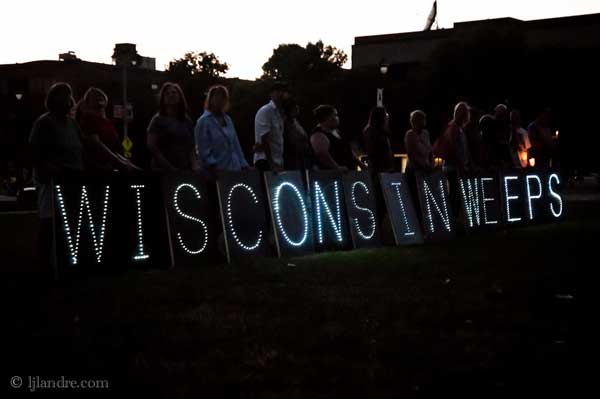OAK CREEK, Wis. (RNS) Few can know what goes through the twisted mind of a mass killer, but Wade Michael Page left behind plenty of signs that he was consumed by one thing: hate.
Page, 40, was identified by police Monday (Aug. 6) as the gunman who killed six worshippers Sunday morning at a Sikh temple here. Local and federal authorities said they were investigating whether the shooting was an act of domestic terrorism.
The bald, heavy man decorated in tattoos and shot dead in an exchange with police played in hate bands and used hate-filled heavy-metal music to recruit white supremacists to the cause.
Page played at gatherings around the country including Hammerfest, the biggest festival of the obscure neo-Nazi genre, the “Lollapalooza of hate,” according to the Southern Poverty Law Center.
Though police are still seeking clues as to what, specifically, triggered the rampage, Page had immersed himself in a skinhead music scene that is small yet virulent and off the radar screen of most Americans. Even so, the loosely aligned movement is active enough to alarm those who monitor hate groups and believe their activity is on the rise.
“There is an entire underworld out there of white supremacist music that the public basically has no idea of,” says Mark Potok, senior fellow at the Montgomery, Ala.-based center, which tracks hate groups.
“The lyrics to the songs these bands sing could not be printed in any newspaper in this country. They are incredibly vile. They call for the murder of all Jews, all black people. When we say it's hate music, we're not kidding,” Potok said.
Teresa Carlson, the FBI special agent in charge, confirmed that investigators are probing Page's ties to white supremacy groups.
Page grew up in Colorado and enlisted in the Army in 1992, where he served at Fort Bragg in North Carolina and other U.S. posts, according to Army documents. He worked in psychological operations. He plunged into the white supremacist music scene after he was demoted and discharged from military service in 1998.
The Army did not disclose what caused him to be disciplined. The Associated Press, citing unnamed defense officials, said he was demoted for getting drunk while on duty and going AWOL.
FBI and local authorities converged Monday on Page's rented home in the Milwaukee suburb of Cudahy, scouring it for clues.
They reported finding more ammunition and weapons in his apartment. Federal ATF agent Bernard Zapor said the 9 mm handgun recovered at the temple had been purchased legally.
In 2011, Page wrote an email — with a subject line reading, “No registering of long guns” — to the U.S. Bureau of Alcohol, Tobacco, Firearms and Explosives:
“Wake Up!!!! No more restrictions on law abiding gun owners! These restrictions do nothing about the criminals they are meant to affect. Why punish and render defenseless the very people that deserve to be protected while HELPING the offenders with such laws? The only other use for such laws is for government to gain control over the people. This is America, and I AM THE GOVERNMENT, not you! Remember who you work for, and your oath!”
After his name, Page added: “Stop tying the hands of the good guys!”
Page is the fifth person on the Southern Poverty Law Center's tracking list who has been tied to crimes in recent years. Among the others was James Von Brunn, who was charged with killing a black security guard at the U.S. Holocaust Museum in Washington, D.C., in 2009. He died awaiting trial.
Page was a guitarist, bassist, lyricist and singer for a series of bands, and the Internet is littered with pictures of him and his bandmates. He looks like others in his crowd — bald, heavy, white men bearing tattoos that are emblems of a racist world.
He founded bands and joined in others, with names such as Definite Hate, End Apathy and Youngland that were affiliated with Hammerskins, one of the oldest and largest skinhead organizations in the country, says Mark Pitcavage, director of research for the Anti-Defamation League, which tracks such groups.
The Hammerskins promote bands and hold an annual music festival, called Hammerfest, at private venues around the country. This year it was in Richmond, Va., on St. Patrick's Day.
Label 56, a Maryland-based record label specializing in the genre, posted a statement on its website distancing itself from Page and saying it was halting sale of music by his band End Apathy.
“Please do not take what Wade did as honorable or respectable and please do not think we are all like that,” the statement said. “We have worked hard over the years to promote a positive image and have posted many articles encouraging people to take a positive path in life, to abstain from drugs, alcohol, and just general behavior that can affect one's life negatively.”
Bill Werde, editorial director of Billboard, which follows the music business, said the genre is tiny in terms of sales, though the Internet and digital distribution have opened new avenues for the music to be heard.
“Hate music is definitely fringe,” Werde said. “You're not seeing these groups selling many albums or selling albums where the mainstream buys music.”
(William M. Welch and Judy Keen write for USA Today. USA Today staff writers Edna Gundersen, Donna Leinwand Leger, Marisol Bello, Gregg Zoroya, and Natalie DiBlasio contributed to this report.)
KRE/AMB END WELCH





